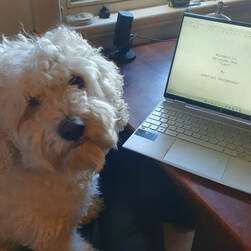How I Learned To Write - Part Five
 This is the fifth instalment in an ongoing series examining the lessons learned from early works. Read Part One here, Part Two here, Part Three here and Part Four here.
This is the fifth instalment in an ongoing series examining the lessons learned from early works. Read Part One here, Part Two here, Part Three here and Part Four here.***
I’ve written a lot – a lot – about the process of writing Windmills/Where The End Began. But what I’ve never really delved into was how I came to write the TV pilot version that won the Sir Peter Ustinov Award and changed my life. It’s funny – the award was such a singular watershed moment for me, one I’ve discussed so much in blogs and school talks and interviews, but I’ve never seriously examined how I won it.
Look at the context – by 2015 I’d been writing consistently for a decade. But I’d never, by anyone’s estimation, had any real success. Yeah I had a bunch of produced plays, but with the exception of a couple of rural youth theatre productions, I’d produced them myself. Likewise anything I’d published, in print or online. I’d never been paid for a piece of my writing. I’d never won or been shortlisted for any awards. Most reviews of my work were tepid. To clarify for anyone following along – this was pre the relative success of We Can Work It Out or publication of Boone Shepard. As I alluded to in my last blog, 2015 was a bad year for me in many ways, the first time I started to really wonder if I was barking up the wrong tree, when I first understood that the only person whose word I had for me being a halfway decent writer was my own.
The best thing I had to cling to was my acceptance into The Victorian College of the Arts’ Master of Screenwriting, a selective course with a decent hit rate of alumni becoming successful writers, but by the start of my final semester there in 2015 I wasn’t feeling all that warmly towards the course. I’d come into it with a combination of arrogance and excitement, believing that my preternatural writing abilities would wow everyone, that I’d be taken under the wing of a mentor who might kindly correct a couple of minor shortcomings then usher me on my way to the big time. Not so. I’d quickly been intimidated by the abilities of everyone else. My ideas were met with a collective shrug. The tutors were quick to point out glaring issues in my writing that I’d never considered before. My response to all of this was to turn defensive and dismissive. As I’d tell anyone who listened, the course was trying to make us write by numbers, everyone was trying to bastardise my brilliant ideas, the tutors just didn’t get me, etc. I was insufferable and tiresome. But really I was just deeply insecure, a young writer starting to realise that he wasn’t as incredible as he liked to believe.
Maybe this is why I floundered so much in my first year at VCA. The final outcome of the course was either a feature film script or a TV pilot and pitch bible, something we in theory would work on for the entire year and a half we spent there. I went in planning to write a feature adaptation of Below Babylon. When nobody seemed to think that concept was as awesome as I did, I pivoted to reworking my play Reunion for the screen before jumping to a not-especially-original concept about money counterfeiting then a black comedy show about a uni student moonlighting as a hitman (several years pre-Barry, this idea would later be re-developed in my podcasting days as an aborted web series called Mel MacDuff) then back to Reunion again. None of this was a waste – for example there was a lot to be learned in taking a small scale, contained stage show and trying to turn it into a Hangover-esque caper comedy film, but by the end of 2014 I was realising with a faint sense of desperation that I had no passion left for Reunion, that I’d pushed the themes and concept as far as they could go and I couldn’t spend another six months working on it. Which left me with the problem of what I’d write instead.
It was over the summer break that I wrote, almost on impulse, the Windmills sequel manuscript. And as I revisited these characters who had been such a massive fixture in my writing life, the blindingly obvious became clear to me. I needed a new concept that I had enough passion for to see me through to the end of the course, but one which knew well enough to not be set back by starting from scratch. Windmills, arguably, was the only thing I could have written at that point.
Looking back on this, I feel so sorry for my tutor,
Published on July 12, 2022 19:04
No comments have been added yet.



